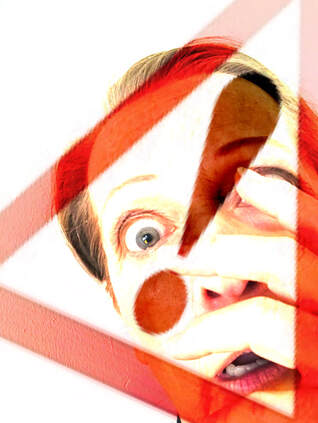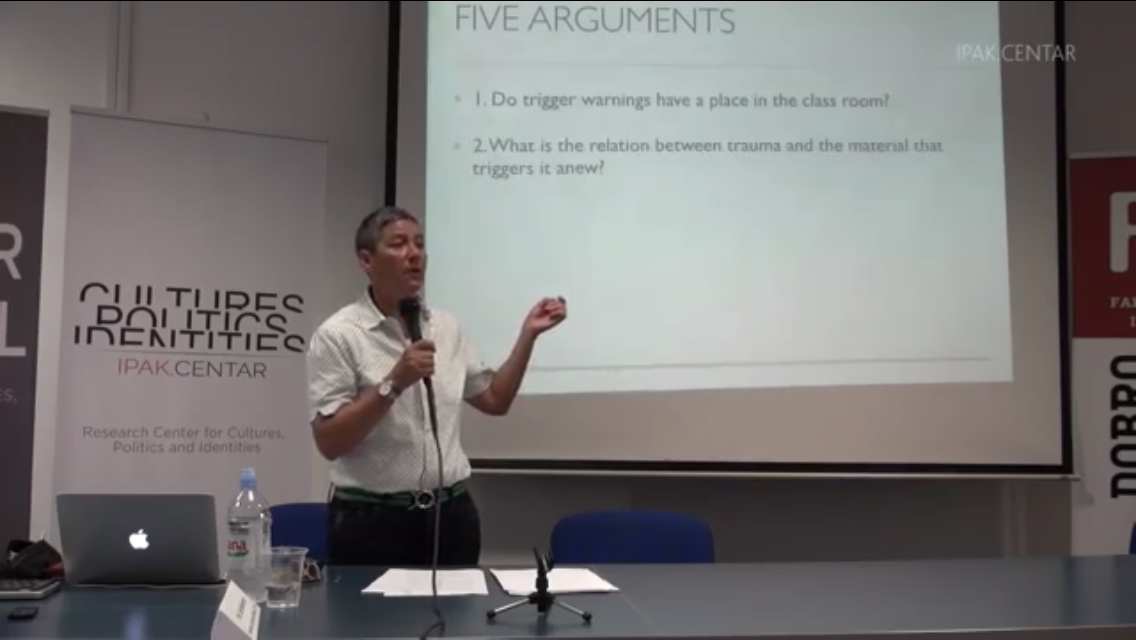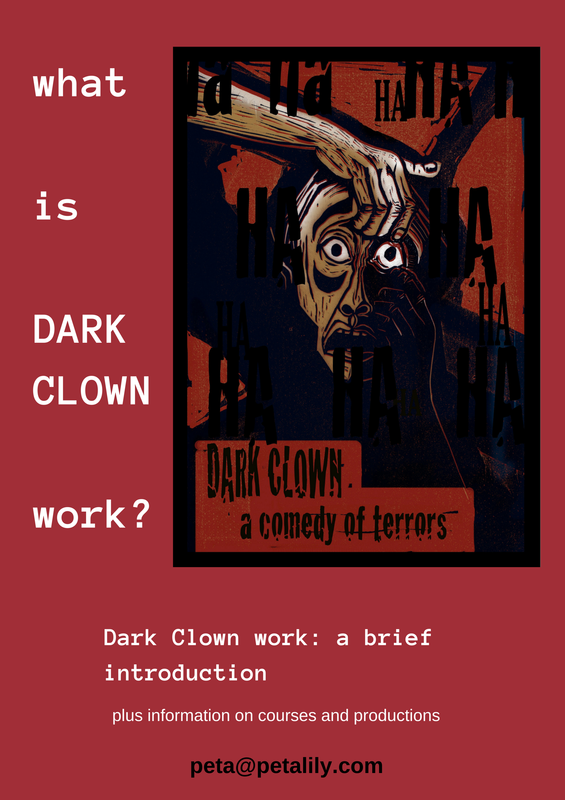
A learning experience
On my open Clown & Dark Clown courses, which are for 'beginners as well as the more experienced idiot', I work with physical theatre performers, circus performers, theatre directors, designers, therapists, actors, improvisers, and people with no performing experience. It's a joyful thing. Often the newcomers bring a freshness of approach. Those with more experience inspire the newcomers by showing what is possible and occasionally those with more experience have habits to undo. Everyone is there to face the new, everyone is at a growing edge.
I salute the courage of all learners. All those who choose to come on a course are opening themselves up to new learning. And learning new skills has the risk of failure built in.
Until you've done it you don't know what it is
I have a little social media post I sometimes use: 'Until you have done it, you don't know what it is.' I guess that statement could come across as a nice little marketing ploy, but, really it's a helpful piece of information.
The post 'Comedy of Terrors' gives a snapshot of my Dark Clown work.* And there is extra information on recent posts such as the one describing an exercise called Selling Yourself out to your Enemy and the one on Consumer Guilt.
So what actually goes on in a Clown & Dark Clown course?**
I am in the process of writing a book on my definition of and approach to what I call Dark Clown. The other day was aiming to succinctly sum up the learning journey on a Clown & Dark Clown course.
Here is what I got:
'The complete beginner will learn play state, how to play with the other, clown state, audience awareness and the beginnings of audience response and the 'more experienced idiot' reviews this early material. Building on from that, the group learns to develop an awareness of principles and techniques of comedy and then to develop an agility with these principles and techniques.
With this established, the student/performer of Dark Clown is trained to create and to release into believable and engaging representations of Marginalised Emotions – then to play and experiment with the representation of these Marginalised Emotions while simultaneously using comic principles and techniques.
Right from the start, in parallel with the above, awareness of and response to the audience in each present moment is also being trained.
Next, we move on to the exercises and scenarios of the High Stakes Predicaments and Dark Clown Scenarios – where the student/performer is tasked with putting all of this together in order to affect and hopefully Implicate the Audience, so that the audience get to experience Troubled Laughter i.e. to be surprised into laughter and to feel troubled by their laughter.'
It's a lot to get through. It's a tight curriculum for a two-day course.
Preparing for the learning experience
At the start of the course, I remind course participants that any new skill comes with challenges and unknowns. I aim to (and have been told that) I 'teach with a good mix of encouragement and challenge.' I seek to empower, for example, by aiming to demystify the 'rules' of comedy. I expressly dedicate the course hours as a learning experience and also as a human experience.*** In both the Red Nose and the Dark Clown sections fo the work, I am transparent about occasionally stepping in to the role of the 'Grumpy Clown Professor' or using my voice to shout out commands as if from a darker authoritarian voice.
Once we have covered Clown State, I say, 'In this exercise, please do stay in Clown State. If you pop out of state, no shame, but the exercise may come to a halt and you can have another go later. You the course participant are allowed to leave the exercise if you choose but you will get the most benefit by dealing with the Grumpy Clown Professor's hectoring while remaining in Clown State.'
When we make the segue to the 'Dark Side' part of the work, I give a talk which outlines the aims and ethos of the work. I emphasise their will be no emotional recall - the work is not at all about people being called on to search in their own inner darknesses. The talk also explains that we will progress through a series of tasks which develop various aspects needed for playing Dark Clown. I also give frequent explanations of the purpose of each exercise or task, and with some exercises check - 'Are you still willing to do the exercise?'
Always articulating the work
Over the many years of teaching my definition of Dark Clown, I have incorporated extra steps and clarifications in order to keep the teaching space a clear arena for the aims and vision of the work as well as to create and maintain a worthwhile learning experience for practitioners.
When advertising my open courses, I aim to be clear about the outcomes on offer and to articulate both the fun and challenges of the course. I prefer people come to the work with an open mind (beginners mind), but over the years it has become necessary to include an extra level of clarification regarding the Dark Clown work.
I now include FAQ's about the work with the booking information. As I say in the post titled Resisting Vunerability, - ''Dark' describes the work rather well.'
Opening up and the possibility of upset
Over all the years, the vast majority of course participants have found and reported the work enlivening and many say, 'I have never laughed so much on a course'. But every so often, someone has an upset while on a course.
Anyone who has taught acting or been an acting student knows that there may be confrontational moments for the student. The actor (and the performer) needs openness and when we open, when we let go of holding patterns - there can be stuff that has been contained which may leak out. Upset is not a required step in the process, but occasionally (comparatively rarely) it happens and so I have put in place a basic and practical methodology for dealing with upset. ****
I worked at a Clown school in Europe and was articulating the 'Upset process' I use to the course booker. They suggested that I might work with people's upsets (they, in their own practice, had a methodology to do that - also a course time of much greater duration).
The Dark Clown work is dependent on the creation of laughter and it is crucial to maintain the conditions for laughter in the room. So while I encourage openness, unmasking and spontaneity, and while I deeply value personal growth, while teaching a Clown & Dark Clown course, my energies are pointed on the discipline and technique of the work rather than the inner journey of the participant.
While there may be an individual experiencing a confrontational moment, there will also be 15 - 17 other people on the course, who are ready and raring to move on to the 'Dark Side' and get a full introduction to Dark Clown work.
Who gets upset at what?
Over all the 30 years of teaching this course - the moment of upset and the precise cause of the upset is always totally unique and personal.
Here is the amazing Jack Halberstam (author of the brilliant 'The Queer Art of Failure') speaking On Behalf of Failure at the Summer School for Sexualities, Cultures and Politics (organised by IPAK Center, held in Belgrade August 2014).
I love Jack because he understands the function of humour and its role in presenting or crafting viewpoints that are not part of the reigning paradigm. he also speaks of his belief of the value of surprise as an element of pedagogy, but that's a side note here.
At 20.41 in this talk he begins to speak about Trigger Warnings - while he applauds sensitivity he also asks whether we being 'careful in a way that is absolutely squashing our ability to also be creative and to communicate.' He then goes on to talk about the origin of the term Trigger Warnings, from its usage in the early online community, and how the term morphed as it segued into a new context. It is now something that (in the USA in particular) students request that professors put on their Syllabi.
Jack finds this problematic because:
1/ to be warned about content in an aesthetic context goes against his pedagogy of surprise (learning is an adventure). As I understand it he means that reveals can cause memorable paradigm shifts - real learning is an experience, not a list of facts.
2/ it's not easy to predict a Trigger - Trigger is usually buried content - and unpredictable, not obvious or linear, for example a random sound that accompanied a traumatic event. He gives the example that one would need to list unforseeable, incidental details e.g. 'a sound screeching tyres'. Jack says that to equate trauma and trigger is a gross simplification.
3/ JH teaches a class on the Holocaust over some several weeks. 'I can't warn you about content in the Holocaust - you should be disturbed by the content of the Holocaust'. The Holocaust was an event of uncountable and unrepresentable horrors.
JH recounts how there were complaints of lack of Trigger Warnings when he showed the film 'Night and Fog', but when he showed 'Triumph of The Will', which shows Fascism played out - there was, unnervingly, if you think about it, not a single complaint.
Jack quips that 'the seduction of Fascism should come with a warning' - and goes on to muse how modernism has represented symmetry as good and right - so, again unnervingly, the crisp formation of marching fascist armies contain an unconscious appeal because symmetry is embedded as an aesthetic form inside our consciousness.
JH quips that he would really like to see a Trigger Warning about 'the seduction of Fascism.'
Coming back to my own Dark Clown work, I wrote in Rehearsing for Darkness:
'I aim to hold the Dark Clown work as ethically as I can. Please do see the helpful FAQ's for the work. The work walks an edge. But, like many theatre practitioners, I have an interest in inner and outer humanity and I feel it is an edge better looked at than ignored.'
* My vision for Dark Clown has key inspirations - one scene in Pip Simmonds' breath-taking and courageous show An Die Musik in the early 1980's. The big and little clown scene in the seminal Lumiere and Son's Circus Lumiere, and the devastating film They Shoot Horses Don't They? (albeit the film is neither clown nor comedy). Often people think the work I do follows a lineage. It doesn't. It began with experiments and developed via teaching and a few theatre productions, for example this one, over the last thirty years. As there are many types of Clown, there can be many expressions of what people might explore under the name of dark clown.
** I have now standardised that my specific approach to Dark Clown work is taught in the first instance on a course called 'Clown & Dark Clown'. There are many reasons for this, and I now always bill the course this way, even when the participants all have a pre-existing Clown training. One basic reason for this is that there are no guarantees that everyone has the same Clown training. Another reason is that, while Clown practitioners can be well-trained, they are still unacquainted with many of the comedy craft techniques necessary to the Dark Clown work. Another reason is that any group needs to relax and develop the ability to play together first, and this works well in Red Nose Clown mode. A further reason is that the imparting of key comedy principles can be accomplished more efficiently in Red Clown mode also. Also, I find it helpful (I could even say essential) that the group establish a sense of ease, trust and fun in working with both teacher and other group members, before we move on to the Dark Side and I find that the Play State/Red Nose Clown exercises are efficient for this.
*** I usually begin courses saying: 'for the next several hours you are in the safest place you can be ... bar floods or other natural disasters ... (I aim to read the room before making that little joke and I add clownish body-language and light and modulated voice and smile clearly making this a joke and also adding a gesture with palms forward that reassures and eyebrows and mouth corners that acknowledge 'oops, was that scary?') ... because Comedy is all about making mistakes. And Clowns are born under a big hot-pink-neon sign saying "Born. To. Fail" - so, if, at any moment you feel you might have done something you are unsure about then give yourself a big tick! You are on mission!'
I often also ask - 'Do we give each other permission to be different from our normal selves?' and wait for and acknowledge the mutual assent. 'We are all humans here and we are all learning and any new learning necessarily encompasses making mistakes.' (I refer to the steps in the unconscious incompetence to unconscious competence model).
I also say - 'If I mention anything any one of you has done, I thank you in advance for the teaching opportunity! I figure any one of us could have had that (miming quotes) success or (miming quotes) failure - but, it was a something that happened live in the space, and we all saw it, and we can learn from it, rather than only having theoretical examples.'
**** While the Clown & Dark Clown course is a lot of fun, it requires a level of resilience. The FAQ's on the Clown & Dark Clown workshop are aimed at helping people who may have underlying issues identify whether the course is right for them to undertake. Just as a side-note, There have also been, a few instances where a course participant experiences upset in the Red Nose part of the work (again, rarely). This is not particular to my teaching and it is not surprising in general. Red Nose Clown work de-masks the individual - some of the normal ways of presenting oneself are unnecessary and unhelpful to clown work and need to be released. When I studied with Gaulier in 1984 - there was always someone crying in the pub at the end of the day after class. (Another side-note: for those more experienced, the work on the self is ongoing. Red Nose Clown work, at its best, requires an opening of the heart, which can bring forward the need for self-examination.)

 RSS Feed
RSS Feed
